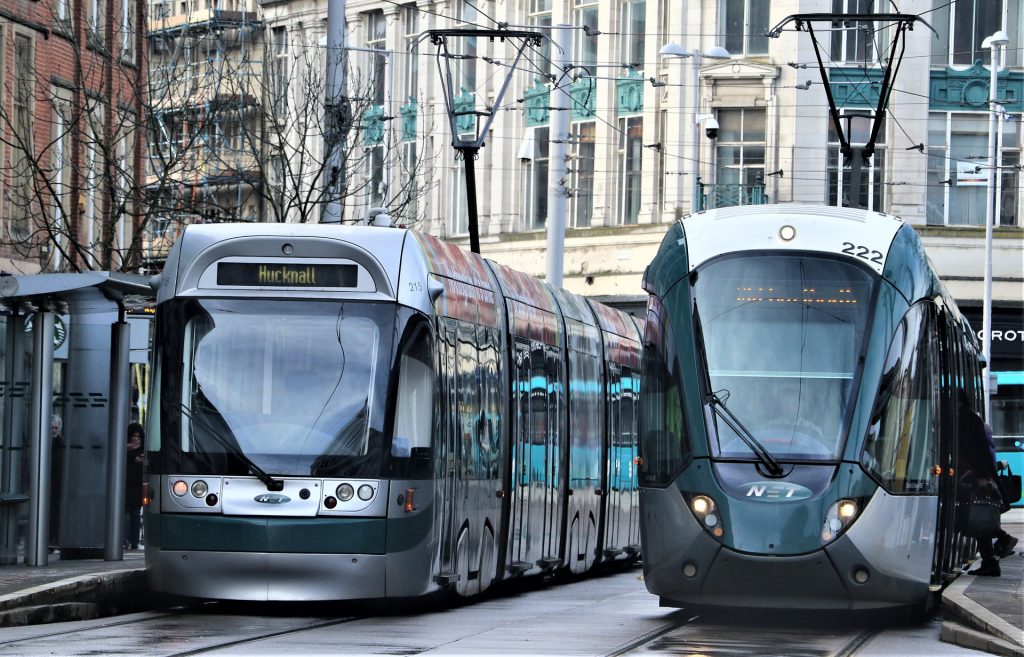Putting solar panels on “everything that doesn’t move”
The city itself is also producing local low-carbon energy. 5,000 homes and more than 100 businesses are being powered by energy created from the city’s waste via one of the country’s largest district heating networks. Additionally, the municipality is becoming a role model by equipping publicly owned buildings and homes with solar panels: 4,000 so far and counting, which has contributed to a substantial reduction in energy consumption. “If it stands still, we’re going to put a solar panel on it,” the City Council’s deputy leader told the Independent newspaper.[2] “And, if it moves, we’re going to do everything we can to make sure it moves on clean energy.”
From polluting cars to green public transport
Looking at the transport sector, it becomes clear that these are not just empty words. In 2012, Nottingham introduced the Workplace Parking Levy, which has proven a great success, despite some initial scepticism. It has inspired other cities in the UK looking for ways to finance their energy transition. This levy is essentially a tax on employers who provide 11 or more commuter parking spaces, charging £415 annually per space. The scheme has incentivised employers to reduce the number of parking spaces they offer and has thus indirectly contributed to a greater use of public transport. Now 40% of journeys in Nottingham are made by public transport, much higher than the national average.
Since 2012 the Workplace Parking Levy has raised £61 million (€67.58 million), which has been used, along with government money, to fund a £580 million (€642.6 million) 20-mile tram network. Alongside this, over the past 17 years, car use has dropped 7 per cent and, unlike most UK urban areas, public transport use has increased — by 7 per cent. While the trams have run entirely on local energy company Robin Hood’s green energy since 2019, 178 of the city’s buses are either electric or biogas, with the diesel buses being retrofitted with exhaust treatment technology.[3] To encourage private vehicle owners to switch to greener forms of transport, Nottingham provides over 300 charging points and is planning to introduce green licence plates that mark low-emission vehicles.
Bringing the Energiesprong approach to the UK
Another sector that Nottingham focuses on is housing. The city’s housing association is the first in the UK to use the Dutch Energiesprong initiative that transforms residential houses into net-zero emission homes. Energiesprong is an approach that brings together housing associations and construction companies which use technologies like prefabricated facades, insulated rooftops with solar panels, smart heating, ventilation and cooling installations to retrofit a house within just one week.[4] Energiesprong does not prescribe which technologies to use, but instead lets contractors decide the approach that is most suitable for them.
After a pilot retrofitting of 10 houses was received enthusiastically, Nottingham secured £5 million (€5.5 million) in EU funding for retrofitting 155 council-owned homes to the Energiesprong standard.[5] Many of the houses chosen for retrofit had insulation issues, with residents feeling cold even when the heating was on.[6] Following a whole house retrofit, both the residents and the environment have benefited from improving the energy efficiency of the home.
Involving residents into the action plan
Nottingham’s City Council understands that a democratic and inclusive approach is key to a successful energy transition. The Council has emphasised repeatedly that they do not want to leave anyone behind and is actively attempting to maximise opportunities for local green employment.
The Council held a public consultation on Nottingham’s 2028 Carbon Neutral Action Plan, allowing people and businesses to give their feedback and ideas for creating a sustainable carbon neutral Nottingham. This process received almost 1,000 responses between an open survey and many face-to-face engagement events, held over an eight-week period, for both businesses and members of the public. The results informed the final action plan which was adopted in June 2020.
Engaging with citizens and businesses across the city is key to co-creating Nottingham’s future and 2028 ambition, and the Council recently held a 28-day engagement campaign with partners across the city, despite the impacts of COVID-19 and the lockdown.[7] Plans are in place for more engagement to ensure all voices can be heard in the process, and more momentum created towards 2028.
With the Council determined to reach the 2028 target and the citizens onboard, Nottingham is set to become one of the most climate-friendly cities of the UK soon.
About the author:
Jonathan Ward is the Principal Energy Policy Officer at Nottingham City Council and leads a small Performance and Policy team in Energy Services, who deliver a range of energy and carbon functions for the Council and across the city. Jonathan and team are responsible for developing, coordinating and implementing the city’s climate, energy and fuel poverty strategies and plans.
This blog article was co-created by Josephine Valeske and is part of the mPOWER blog series in which cities and towns share how they are building better energy futures. The article was originally published on https://municipalpower.org/articles/nottinghams-plan-to-win-the-race-to-carbon-neutrality/. The project has received funding from the European Union’s Horizon 2020 research and innovation programme under grant agreement number 785171.
[1] https://www.nottinghamcity.gov.uk/cn2028
[2] https://www.independent.co.uk/news/uk/home-news/nottingham-carbon-neutral-climate-change-global-warming-emissions-a9287851.html
[3] https://www.independent.co.uk/news/uk/home-news/nottingham-carbon-neutral-climate-change-global-warming-emissions-a9287851.html
[4] https://passivehouseplus.ie/magazine/insight/energiesprong
[5] https://www.energiesprong.uk/projects/nottingham
[6] https://www.theguardian.com/society/2019/jan/07/dutch-eco-homes-idea-arrives-in-uk-and-cuts-energy-bills-in-half-nottingham-energiesprong?CMP=share_btn_link
[7] https://www.nottinghamcity.gov.uk/your-council/about-the-council/carbon-neutral-nottingham-2028/28-day-challenge-introduction/


